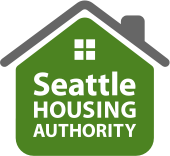New system in place for billing utilities at NewHolly and other family communities
SEATTLE—December 19, 2005—Seattle Housing staff and NewHolly residents have worked together this year to find a better way to account for and bill utilities in the NewHolly community. In the past, billing was handled by a third party company and a surcharge was added onto residents’ water bills.
“We are aware that NewHolly residents have been very frustrated with the entire water billing situation,” said Tom Tierney, SHA executive director. “We are confident that with these two steps – the elimination of the surcharge and the billing of services being done directly by Impact Property Management – many resident concerns will be answered.”
This past fall, Impact Property Management (a division of SHA) assumed responsibility for utility billings. Seattle Housing ended its contract with Minol, which had been previously responsible for billing.
The surcharge that residents renting at NewHolly have paid since 1999 will be removed from their water bills beginning in January 2006. The Housing Authority will assume the surcharge payment at that time. This surcharge was added to NewHolly utility bills and was intended to be a mechanism to reimburse Seattle Public Utilities for its contribution to the new water lines that were part of the construction at NewHolly.
At the time it was assumed that the increased utility costs would be covered by HUD subsidies and would have little effect on individual residents. Unfortunately, this has not been the experience for many NewHolly residents.
Also, effective in January 2006, new utility allowance rates will go into effect at NewHolly, Rainier Vista and High Point. “Utility allowances used in these communities are the same ones used in the Section 8 program, and they have been recently revised,” noted Tierney. “It seemed logical to us to make both of these changes at the same time.”
“We didn’t think it was fair for NewHolly residents to pay more for their water than residents in our other family communities like Rainier Vista and High Point,” said Tierney. “Even though, on average, the residents’ utility allowances covered the entire bill, NewHolly residents were still paying more for water than others in the same situation. Now, all residents will be on the same footing.”
On average, utility allowances were sufficient to cover both the surcharges and the regular water bills. However, some residents found the water bills excessive.
The current utility allowances that have been in place at NewHolly are based on national averages, which tend to be slightly higher than the actual cost of utilities here in the Northwest, due to climate differences. The new utility allowances are based on local data and were determined by a consulting firm that specializes in analyzing this data and drafting utility allowances. In some cases, the new allowances will be lower than the current ones. Where this is the case, a household’s rent will then be slightly higher.
“Overall, each household is expected to pay 30 percent of their income for rent and utilities,” explained Willard Brown, redevelopment property manager at SHA. “When their rent is calculated, the household gets to keep the amount of their utility allowance so that they can use that money to pay the utility bills. If that amount goes down, then their rent will go up by the same amount.” Residents will receive specific written notice of any changes in their rent.
Over the past month, NewHolly residents have had the opportunity to attend presentations on these changes and get their questions answered from Seattle Housing Authority staff. Over the next few months, Seattle Housing, in cooperation with the utility companies, will sponsor workshops for households in the three communities. The first one was at NewHolly this month. The workshops focus on helping residents understand ways they can conserve on utilities.
